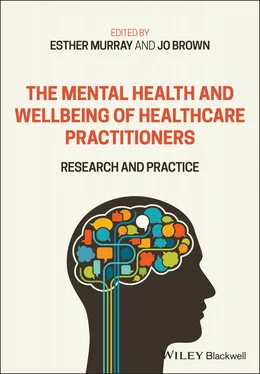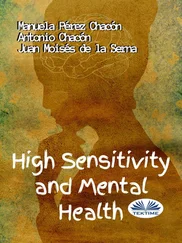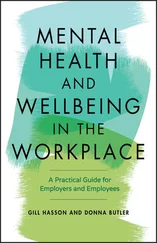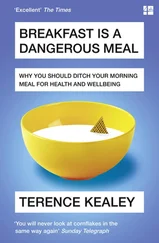The Mental Health and Wellbeing of Healthcare Practitioners
Здесь есть возможность читать онлайн «The Mental Health and Wellbeing of Healthcare Practitioners» — ознакомительный отрывок электронной книги совершенно бесплатно, а после прочтения отрывка купить полную версию. В некоторых случаях можно слушать аудио, скачать через торрент в формате fb2 и присутствует краткое содержание. Жанр: unrecognised, на английском языке. Описание произведения, (предисловие) а так же отзывы посетителей доступны на портале библиотеки ЛибКат.
- Название:The Mental Health and Wellbeing of Healthcare Practitioners
- Автор:
- Жанр:
- Год:неизвестен
- ISBN:нет данных
- Рейтинг книги:3 / 5. Голосов: 1
-
Избранное:Добавить в избранное
- Отзывы:
-
Ваша оценка:
- 60
- 1
- 2
- 3
- 4
- 5
The Mental Health and Wellbeing of Healthcare Practitioners: краткое содержание, описание и аннотация
Предлагаем к чтению аннотацию, описание, краткое содержание или предисловие (зависит от того, что написал сам автор книги «The Mental Health and Wellbeing of Healthcare Practitioners»). Если вы не нашли необходимую информацию о книге — напишите в комментариях, мы постараемся отыскать её.
Explore this innovative new volume covering the growing mental health crisis amongst healthcare practitioners The Mental Health and Wellbeing of Healthcare Practitioners
The Mental Health and Wellbeing of Healthcare Practitioners
The Mental Health and Wellbeing of Healthcare Practitioners — читать онлайн ознакомительный отрывок
Ниже представлен текст книги, разбитый по страницам. Система сохранения места последней прочитанной страницы, позволяет с удобством читать онлайн бесплатно книгу «The Mental Health and Wellbeing of Healthcare Practitioners», без необходимости каждый раз заново искать на чём Вы остановились. Поставьте закладку, и сможете в любой момент перейти на страницу, на которой закончили чтение.
Интервал:
Закладка:
Library of Congress Cataloging‐in‐Publication Data
Names: Murray, Esther, editor. | Brown, Jo, 1957– editor.
Title: The mental health and wellbeing of healthcare practitioners : research and practice / edited by Esther Murray, Jo Brown.
Description: First edition. | Hoboken, NJ : Wiley, 2021. | Includes bibliographical references and index.
Identifiers: LCCN 2021007912 (print) | LCCN 2021007913 (ebook) | ISBN 9781119609513 (paperback) | ISBN 9781119609537 (adobe pdf) | ISBN 9781119609551 (epub)
Subjects: MESH: Burnout, Professional–prevention & control | Health Personnel–psychology | Compassion Fatigue–prevention & control
Classification: LCC R727.3 (print) | LCC R727.3 (ebook) | NLM WA 495 | DDC 610.69–dc23
LC record available at https://lccn.loc.gov/2021007912LC ebook record available at https://lccn.loc.gov/2021007913
Cover Design: Wiley
Cover Image: © DrAfter123/Getty Images
Editor Biography
Prof Jo Brown EdD, MSc, BSc (Hons)Jo is Professor Emerita of Medical Education at Barts and The London School of Medicine and Dentistry, Queen Mary University of London. She was the former Deputy Vice Principal for Education at Queen Mary leading on Programme Review and the migration of education into a blended format in light of the COVID‐19 pandemic. Her previous roles include being Head of Clinical Communication and Academic Director of the Student Experience at St George’s, University of London. Jo has been teaching since 1992, has specialised in Clinical Communication as a topic since 1998 and her passion for the subject is infectious. In 2012 she won a prestigious National Teaching Fellowship award from Advance HE. She has a particular interest in providing academic support for students who struggle or fail whilst at university.
She is a curriculum leader and designer, an examiner and an external examiner and has spent two years visiting medical schools in The Netherlands and Canada to explore different conceptualisations of medical education. She is an experienced mentor of teachers in higher education and runs courses on teaching and learning as part of professional staff development. She developed and delivers postgraduate courses for senior doctors on the practical application of clinical communication in everyday clinical practice. She is a member of the Association for the Study of Medical Education and is a Principal Fellow of the Higher Education Academy. Her research interests center on the movement of learning from classroom to clinical environment and the challenges to learning in the clinical workplace.
Dr Esther Murray CPsychol AFBPsS SFHEAEsther has been a health psychologist for 13 years, initially working in cardiac care both in service improvement and psychological interventions for patients, later going on to a career in academia. Her early research was in chronic pain and its effect on doctor–patient communication. Esther has previous experience in psychological intervention in cardiac care and training NHS staff in communication skills.
Esther is the first researcher in the UK to explore the concept of moral injury in medicine, and was invited to present on the topic at the Institute of Pre‐hospital Care Performance Psychology in Medicine Symposium in June 2017. Esther has been invited to present at national and international conferences for healthcare professionals, educators and students. Esther also delivers training on the moral injury and psychological wellbeing to London Ambulance Service’s Advanced Paramedic Practitioners, the Counter Terrorism Specialist Firearms Officers of the Metropolitan Police and is a regular contributor to London HEMS Clinical Governance Days.
Esther has recorded podcasts for WEM, St Emlyns, The College of Paramedics and for the London Advanced Paramedics and East of England Ambulance Service, she also delivers wellbeing workshops at the Royal London Hospital for staff in theatres and at the Royal College of Emergency Medicine and the Intensive Care Society.
List of Contributors
Tony AllnattRoyal London Hospital, London, UK Barts Health NHS Trust, Whitechapel, London, UK
Ruth AndersonScottish Ambulance Service, Scotland, UK
Helen BintleyBarts and The London School of Medicine and Dentistry, Queen Mary University of London, London, UK
Rebecca ConnollyNottingham University Hospitals NHS Trust
Astrid CoxonInstitute of Psychiatry, Psychology & Neuroscience, King's College London, London, UK
Danë GoodsmanBarts and the London School of Medicine and Dentistry, Queen Mary University of London, London, UK
Bernice HancoxParamedic and Psychotherapist
Liz HarrisCollege of Paramedics, Bridgewater, UK
Andrea JamesBrabners LLP Law Firm, Manchester, UK
Joanne MildenhallFaculty of Health & Applied Sciences, University of the West of England, Bristol, UK
Clare MorrisBarts and the London School of Medicine and Dentistry, Queen Mary University of London, London, UK University of Cambridge, Cambridge, UK
Esther MurrayBarts and The London School of Medicine and Dentistry, Queen Mary University of London, London, UK
RustySt Emlyns, England, UK
Imogen SkeneQueen Mary University of London, London, UK
Gail ToppingScottish Ambulance Service, Scotland, UK
Matthew WaltonNational Health Service, London, UK
Jo WinningDepartment of English, Theatre and Creative Writing, Birkbeck, University of London, London, UK
Tsz Lun Ernest WongBarts and the London School of Medicine and Dentistry, Queen Mary University of London, London, UK
Louise YounieBarts and The London School of Medicine and Dentistry, Queen Mary University of London, London, UK
Introduction
This book is the work of healthcare professionals and allied health professionals who have made the psychological wellbeing of their colleagues a part of their working lives. They are all, in one way or another, involved in the culture change which we know is needed in healthcare in order to keep staff safe and allow them to work in jobs that they love for as long as they want to. There are chapters written by psychologists, paramedics, general practitioners, anaesthetists and others; some are very personal stories of transformation, some are about interventions, some are traditional research and all focus on making spaces for those working in healthcare to be heard and find ways of managing the pressures of the job. Since starting work in a medical school it has become increasingly clear to me that there is a battle for the words to describe the experiences of staff as they deal with the trauma that they witness and also the day to day difficulties of understaffing, and the pressure to perform. There is certainly much more to say, and I see this book as the beginning, rather than the end, of the conversation.
I originally gave this book the title ‘borrowed words’ because I noticed how much words like resilience, burnout, compassion fatigue and so on were being used, all of which were developed in and borrowed from fields other than medicine. It has become increasingly common in medicine to borrow from other fields, probably the most well‐known example is the borrowing of learning about human factors and safety from the field of aviation. Certainly this has been extremely useful in improving patient safety and developments in this area continue, always looking to develop more effective safety cultures in healthcare. ( Chapter 13of this book refers to such culture change.) Other borrowing is perhaps less useful, the wholesale dissemination of terms from other professional areas such as psychotherapy or social work will not apply in medicine and the uncritical adoption of these terms leads only to further resistance. The term resilience is an excellent example here. It originally describes the quality of materials to return to their original shape after being subjected to stressors such as bending or stretching, it was later applied in the field of child and developmental psychology in order to understand how children adapted to, and perhaps flourished despite, adversity. Its adoption in popular psychology has seen it applied in many different areas, perhaps without appropriate rigour. In healthcare it came to be seen as an entirely individual feature, and there was an emphasis on intervening to create more resilient staff. Such an endeavour was bound to fail given that not all members of staff would have started from the same baseline of stress and distress, or with the same individual traits, and that healthcare is not a system based on individuals but on teams. In fact, the research on resilience states that while there are individual traits which might be useful, they hinge largely upon the ability to enlist appropriate support when things are hard. So, while the ability to regulate one's emotions is an aspect of resilience, seeking a friend or colleague to talk to is an excellent way to regulate emotions. Failing to engage in sufficient depth with psychological concepts which might have been useful has meant that some concepts, such as resilience, have become buzzwords for management failure to properly support staff, seeming only to put the burden of coping back in the shoulders of staff rather than providing appropriate support and commitment to structural change.
Читать дальшеИнтервал:
Закладка:
Похожие книги на «The Mental Health and Wellbeing of Healthcare Practitioners»
Представляем Вашему вниманию похожие книги на «The Mental Health and Wellbeing of Healthcare Practitioners» списком для выбора. Мы отобрали схожую по названию и смыслу литературу в надежде предоставить читателям больше вариантов отыскать новые, интересные, ещё непрочитанные произведения.
Обсуждение, отзывы о книге «The Mental Health and Wellbeing of Healthcare Practitioners» и просто собственные мнения читателей. Оставьте ваши комментарии, напишите, что Вы думаете о произведении, его смысле или главных героях. Укажите что конкретно понравилось, а что нет, и почему Вы так считаете.












